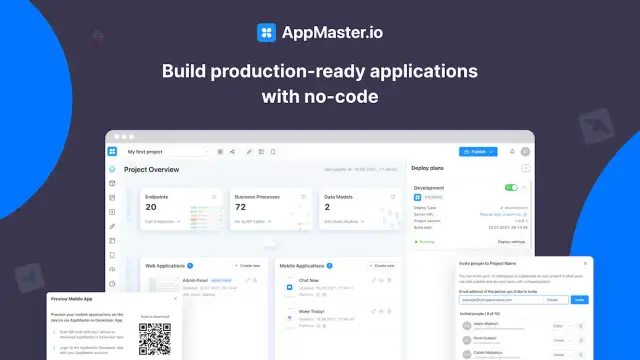How Does OpenAI Shape the Future of Conversational Apps?
Discover how OpenAI drives the evolution of conversational apps, enabling greater efficiency and capabilities in customer service, support, and more. Explore potential use cases demonstrating the transformative impact of AI on these solutions.

Conversational apps refer to applications that facilitate effective and interactive communication between machines and humans through text or voice interfaces. These apps have gained immense popularity in recent years, finding applications in various industries such as customer support, personal assistants, e-commerce, and more.
As artificial intelligence (AI) advances, companies are leveraging AI technologies to create conversational apps that can better understand user intent and respond accordingly. OpenAI, an AI research lab, is at the forefront of developing and promoting AI solutions with the potential to revolutionize various industries, including conversational applications.
By harnessing OpenAI's state-of-the-art AI models, conversational apps can significantly improve their efficiency, effectiveness, and user experience, leading to new opportunities and innovative use cases.
Enhancing Customer Support with OpenAI
Customer support is a crucial aspect of any business, and conversational apps can play a vital role in providing a quick and efficient platform for resolving customer queries. Integrating OpenAI's capabilities into these apps can take customer support to the next level.
One of the primary advantages of using OpenAI-driven conversational apps is automation. By automating customer interactions, companies can drastically reduce their response times and cut costs associated with maintaining large customer support teams. AI-powered chatbots and virtual assistants can handle a wide range of queries, and with continuous improvement through machine learning, they can become even more effective over time.
OpenAI's AI models are designed to understand natural language, enabling conversational apps to process and comprehend complex user inputs. This capability allows them to respond with accurate and relevant information, increasing customer satisfaction and loyalty.
Furthermore, OpenAI-generated conversational apps can handle multiple customers simultaneously, reducing the wait time for users needing assistance. This level of scalability allows businesses to expand their customer support capabilities without significantly increasing operational expenses.
Transforming Customer Experience Using OpenAI
The use of OpenAI in conversational apps has the potential to revolutionize customer experience across various industries. By implementing AI-driven conversational technologies, businesses can significantly enhance their customer communication and interaction, improving user experience. Here are some ways in which OpenAI can enhance customer experiences using conversational apps:
- Personalization: OpenAI's advanced AI models allow conversational apps to understand customer preferences, behaviors, and needs. By analyzing user interactions and leveraging machine learning algorithms, these apps can provide customized experiences and recommendations tailored to individual users.
- 24/7 Availability: Thanks to AI-powered automation, businesses can provide round-the-clock customer support with reduced costs. Users can access help and information at any time, leading to improved convenience and satisfaction.
- Real-time Language Translation: OpenAI-powered conversational apps can effortlessly translate customer queries and responses in real-time, removing language barriers and expanding the reach of businesses to a more global audience.
- Reduced Human Error: AI-driven conversational apps can eliminate the chances of human error associated with manual customer support. By leveraging the power of AI, conversational apps can provide accurate and timely information, leading to more satisfied and better-informed customers.
- Emotion Recognition and Sentiment Analysis: OpenAI's advanced AI capabilities enable conversational apps to analyze user emotions and sentiments, allowing businesses to better understand customer feelings and respond to their needs more effectively.
OpenAI-driven conversational apps are transforming customer experiences for the better. By automating conversations, providing personalized experiences, and leveraging advanced AI capabilities, these intelligent applications can significantly enhance user satisfaction and help businesses improve their customer support operations.
Innovative Applications of OpenAI in Conversational Apps
The advancements in OpenAI technology bring numerous innovative applications for conversational apps. By integrating these cutting-edge AI solutions, businesses across various industries can streamline their customer service processes and enhance their impact on customer experience. Let's explore some notable applications of OpenAI in conversational apps:
Virtual Assistants
Powered by OpenAI, virtual assistants can provide users with accurate and efficient support through natural language processing (NLP) and machine learning algorithms. These virtual assistants can handle various tasks, such as answering queries, booking appointments, and offering personalized recommendations. Businesses can significantly improve their customer support by employing AI-driven virtual assistants while reducing operational costs.
Customer Support Chatbots
OpenAI can revolutionize customer support chatbots by allowing them to understand and process user requests more effectively. By integrating OpenAI's advanced language models, chatbots can engage in more human-like interactions, handle complex queries, and provide tailored solutions. This results in increased customer satisfaction, quicker resolution times, and a more engaging user experience.

AI-Powered Call Centers
Call centers equipped with OpenAI technology can automate and optimize their call handling processes, significantly reducing the burden on human agents. AI-powered call centers are capable of understanding various accents and dialects, enabling them to cater to a more diverse customer base. By employing OpenAI in call centers, businesses can improve agent productivity, reduce wait times, and provide better support.
Sentiment Analysis
Through sentiment analysis, OpenAI-powered conversational apps can gauge customers' emotions during interactions. This can help businesses identify areas of improvement, enhance their services, and gain valuable insights into customer preferences. Sentiment analysis also allows companies to tailor their marketing campaigns by targeting specific emotions and customer sentiments.
Language Translation Services
OpenAI's advanced language models can significantly improve language translation services within conversational apps. By leveraging this technology, businesses can cater to a global audience, breaking down language barriers and providing seamless communication. Real-time translation capabilities in conversational apps can also benefit international customer support and communication between different linguistic groups.
Real-Time Transcription Services
OpenAI-driven conversational apps can provide real-time transcription services for various situations, such as conference calls, webinars, and board meetings. By offering accurate and efficient transcription, businesses can improve accessibility, enhance communication, and streamline note-taking processes for a more comprehensive understanding of critical conversations.
Integrating OpenAI with AppMaster's No-Code Platform
Integrating OpenAI into your conversational apps can now be easily accomplished through powerful no-code platforms like AppMaster. AppMaster enables the rapid development of backend, web, and mobile applications without extensive coding knowledge. By leveraging OpenAI's capabilities with AppMaster's efficient no-code solutions, businesses can harness the power of AI for their conversational apps without any hassle.
AppMaster offers seamless integration with OpenAI through its intuitive and user-friendly interface. This allows developers and non-developers alike to create powerful conversational apps that harness the potential of OpenAI's advanced language models, machine learning algorithms, and natural language processing capabilities. With AppMaster, you can reap the benefits of AI technology for your apps in a cost-effective, scalable, and efficient manner.
Furthermore, AppMaster's no-code platform enables the continuous improvement and updating of your conversational apps as AI technology evolves. This ensures your applications remain competitive and relevant in the ever-changing technological sphere.

Challenges and Considerations in Implementing OpenAI
While OpenAI has the potential to revolutionize conversational apps, there are certain challenges and considerations that businesses should be aware of when implementing this technology. Here are some key factors to consider when integrating OpenAI into your conversational apps:
Data Privacy Concerns
Handling sensitive user information and maintaining data privacy are paramount concerns for all businesses. Security and compliance with data protection regulations, such as GDPR, are crucial when implementing OpenAI in conversational apps. Ensuring proper data handling and storage processes will enable businesses to protect their customers' privacy and maintain compliance with relevant laws and regulations.
Biased AI Models
AI models may carry unintentional biases due to their training on large datasets, which can lead to unfair or unrepresentative solutions for certain users or groups. It is crucial to monitor and evaluate your OpenAI models for potential biases regularly. This can be achieved through comprehensive testing, validation, and modification of AI models to ensure fair and unbiased outcomes for all users.
Smooth Integration with Existing Systems
As with any new technology, integrating OpenAI into your existing systems should be handled carefully. Businesses should consider the potential impact on their current operations and infrastructure before implementing OpenAI. This includes assessing the compatibility of AI solutions with existing platforms and software and any required adjustments to workflows and processes.
Staying Up-to-Date with AI Advancements
AI technology constantly evolves, and businesses must stay on top of the latest advancements to maintain a competitive edge in the market. Ensuring that AI-powered conversational apps remain up-to-date with current AI research and developments will drive continued improvements in customer service and user experience. Regular evaluation and optimization of AI models will ensure your conversational apps remain relevant and effective.
By addressing these challenges and considerations, businesses can unlock the potential of OpenAI technology for their conversational apps, leading to improved efficiency, customer satisfaction, and performance. Implementing OpenAI in your conversational apps, while overcoming these challenges, will usher in a new era of AI-driven communication and customer support solutions, setting your business apart from the competition.
The Future Outlook for Conversational Apps Powered by OpenAI
The rapidly evolving industry of artificial intelligence, led by advancements from labs like OpenAI, brings forth crucial implications for the future of conversational apps. With AI technologies becoming more accessible and widely adopted, we can expect a significant transformation in how people interact with applications and services. In this section, we will discuss the key developments expected in the future of conversational apps powered by OpenAI and the potential impact of these advancements on user experience, customer service, and business operations.
More Human-like Conversations
Continued progress in natural language understanding and generation by OpenAI will enable far more sophisticated, human-like interactions with applications. Users can look forward to systems that understand context and maintain a conversation, resulting in a more natural and seamless communication experience. Moreover, improving sentiment analysis and emotion detection will enhance the apps' ability to provide empathetic and supportive assistance.
Wider Range of Languages and Accents
OpenAI's advancements in multilingual support will likely lead to broadening language capabilities for conversational apps. Supporting multiple languages and regional accents will open up opportunities for applications to cater to a more diverse and global user base, fostering more inclusive solutions and better-suited interactions for various demographics.
Automated Workflow Integration
As OpenAI pushes the boundaries, we can expect conversational apps to interact with users, integrate with other systems, and automate various workflows. AI-driven conversational apps may contribute to process automation, streamlining tasks such as data input, order processing, or appointment scheduling. Businesses can achieve higher efficiency and productivity by leveraging AI in these operational tasks.
Improved Privacy and Security
Ensuring privacy and security becomes increasingly important as AI technologies become more advanced. Future conversational apps will likely need to incorporate advanced privacy and security mechanisms to protect user data and maintain trust. This will involve end-to-end encryption, strong user authentication, and secure handling of sensitive information.
Advanced Analytics and Predictive Capabilities
With conversational apps powered by OpenAI, businesses can potentially gain access to advanced analytics and predictive capabilities. By analyzing user interactions and preferences, these apps can help organizations make data-driven decisions in areas such as product development or marketing strategies. Furthermore, predictive analytics can anticipate user needs, providing proactive assistance to enhance user satisfaction and drive customer retention.
Easier Integration Across Different Platforms
Future conversational apps powered by OpenAI will be increasingly platform-agnostic, making it easier for users to integrate and deploy these solutions across various devices, operating systems, and channels. This development will enable organizations to provide a seamless and consistent user experience across multiple touchpoints, simplifying engagement and ensuring a uniformly high quality of customer service.
Real-time Collaboration in Conversational Apps
Integrating OpenAI may pave the way for real-time collaboration and communication in conversational apps, fostering teamwork and enhancing productivity. Users could engage in contextually aware conversations, share information, discuss ideas, and co-edit content within the app, resulting in a more immersive, engaging experience.
The future outlook for conversational apps powered by OpenAI is promising, with numerous opportunities for technological advancements and innovative use cases. From improving customer service to enhancing user experience and boosting productivity, OpenAI's role in shaping the future of conversational apps will undoubtedly bring significant value to businesses and users alike. By staying up-to-date with the latest advancements in AI technology and integrating them into applications and services, organizations can reap the benefits of this rapidly evolving sphere and create more effective, engaging, and efficient conversational solutions.
FAQ
OpenAI is an artificial intelligence research lab that focuses on creating and promoting friendly AI for the benefit of humanity. Its advanced AI technologies have significant potential to revolutionize various industries and applications, including conversational apps.
Conversational apps can utilize OpenAI's cutting-edge AI models to improve efficiency and effectiveness in customer service and support. By automating conversations, AI-driven conversational apps can reduce response times, cut costs, and drive customer satisfaction.
Use cases for OpenAI in conversational apps include virtual assistants, customer support chatbots, AI-powered call centers, sentiment analysis, language translation services, real-time transcription services, and more.
Yes, OpenAI can be integrated with no-code platforms like AppMaster to enhance the capabilities of your app. AppMaster's powerful no-code platform enables seamless integration of AI technologies, improving efficiency, scalability, and user experience.
Some potential challenges in implementing OpenAI for conversational apps are data privacy concerns, biased AI models, ensuring smooth integration with existing systems, and staying up-to-date with the latest advancements in AI technology.
OpenAI has the potential to transform the future of conversational apps, creating more sophisticated, efficient, and effective communication solutions. Implementing AI-driven conversational technologies may significantly enhance customer service, user experience, and business operations.





